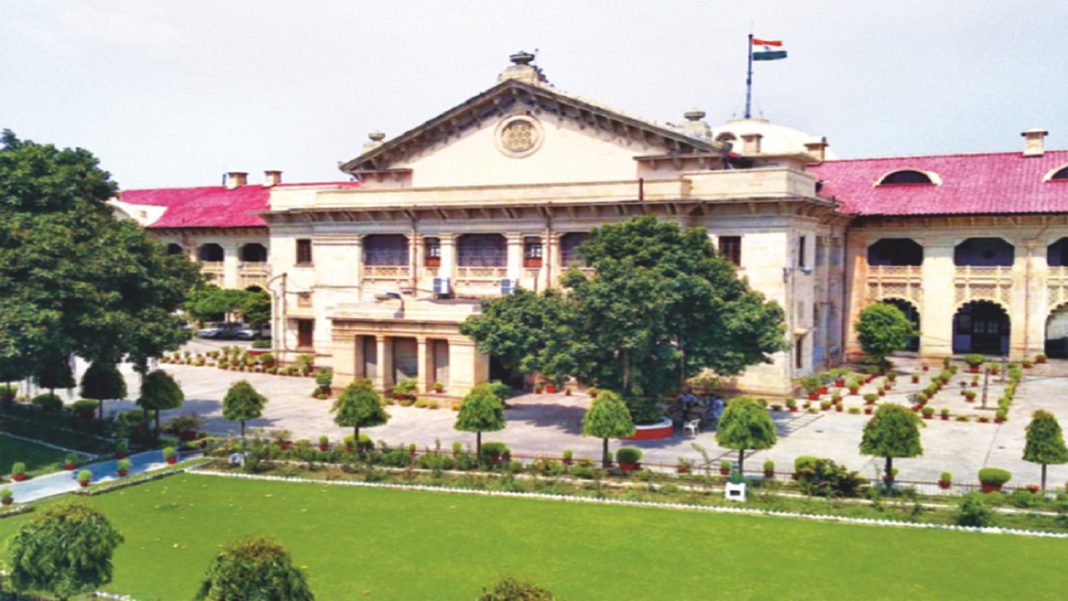The Allahabad High Court has refused any relief against the order for the demolition of ‘Sarv Seva Bhawan’ in Varanasi.
The Division Bench of Justice Mahesh Chandra Tripathi and Prashant Kumar while hearing the petition of ‘Akhil Bharat Sarva Seva Sangh and another’ said that the petitioner should go to the lower court.
The writ petition under Article 226 of Constitution of India is preferred for following reliefs:-
“(1) Issue an appropriate writ, order or direction in the nature of certiorari quashing the order no1339/Ra-Saha-Pratham/2023 dated 26.06.2023 passed by the District Magistrate, Varanasi and the demolition notice dated 27.06.2023 issued by the Administration of Northern Railways, Indian Railways.
(2) Issue an appropriate writ, order or direction commanding respondents not to disturb the peaceful conduct of day-to-day affairs of Akhil Bharat Sarva Seva Sangh over its property situated at village Kalokohan, Pargana Dehat Amanat, Mohalla Rajghat, Kashi, District Varanasi.
(3) Pass any such other or further order (s) as the Court may deem fit and proper in the facts of the case;
(4) Award costs in favour of the petitioners.”
S.P Singh, Additional Solicitor General of India has raised preliminary objection regarding maintainability of the writ petition, firstly on the ground that the petitioners Society has preferred an Original Suit (Akhil Bharat Sarva Seva Sangh and another vs State of UP and others) in the Court of Civil Judge (Senior Division) Varanasi for declaration as well as permanent and mandatory injunction against the defendants and the same is stated to be pending consideration.
Secondly, some persons having stake in the property in question have already approached the Court by preferring Writ petition (Mohammad Saleem and 4 others vs Union of India and 4 others) connected with four other writ petitions, challenging the eviction notice issued by the Assistant Divisional Engineer, Northern Railway, Varanasi.
A coordinate Bench of the Court has declined to interfere with the notices or action of the respondents for removal of encroachments, which was subject matter of challenge in the aforesaid writ petitions and dismissed the writ petitions on 16.5.2023 on the ground that the said petitioners have completely failed to prove their title over the land in question and on the contrary the respondent i.e, Department of Railways, has clearly demonstrated that the land belong to the Railways.
He further submitted that the Assistant Registrar, Firms, Societies and Chits, Varanasi had moved an application under Section 13B (3) of the Societies Registration Act, 1950 for dissolution of the petitioners Society registered as Misc Application and finally, the Additional District Judge, Varanasi vide order dated 28.05.2007 had allowed the said Misc Application.
Against the order dated 28.5.2007, the petitioners have also filed writ petitions (Akhil Bharat Sarva Sewa Sangh and another vs State of UP and others) and the same was disposed of by the Court on 26.5.2023.
He fairly states that once the petitioners Society has already filed the aforesaid Original Suit for declaration and permanent injunction then the appropriate remedy of the petitioners is to press the same in the suit proceeding.
The Court said that,
The main object of grant of temporary injunction is to protect the rights of a party pending litigation and also to prevent future injury. Though various principles have been laid down for the grant of temporary or interim injunction, but the Court must take into consideration three important conditions for the grant of temporary or interim injunction i.e, (i) Prima Facie Case; (ii) Balance of Convenience; and (iii) Irreparable Injury.
Before an order of temporary or interim injunction is passed a party has to prove the existence of the above three important ingredients. But, ultimately it is for the Court to decide as to whether, in the facts and circumstances of the case, it is necessary to protect the property, which is the subject matter of the suit, from being damaged. The right of a party with regard to the property could be secured by issuing prohibitory orders.
“Where a party moves the Court for grant of injunction under Order XXXIX Rule 1 or 2, he has to satisfy the Court that the opposite party has threatened or intended to remove or dispossess the property or threaten to dispossess him or otherwise cause injury in relation to the property or the property in dispute is in danger of being wasted, damaged or alienated or fully sold in execution of the decree as provided under Rule 1 (a) (b) and (C) of Order XXXIX or the conditions contemplated in Rule 2 of the Code.
Considering the facts and circumstances, we are not inclined to entertain the writ petition”, the Court observed while disposing the petition.
“However, it is always open to the petitioners to press the injunction application filed along with the aforesaid Original Suit before the Court below.
The observations made by the Court would not affect the rights/titles of the parties in the on-going proceedings and the same would be decided on its own merits”, the order reads.


